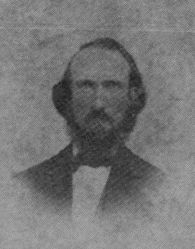Samuel Boykin, editor of Georgia Baptists’ Christian Index newspaper, this week offers commentary on how the Confederacy, a Christian nation, should treat their enemies–Northerners.
The religion of Jesus announced a rule of conduct which amazed the philosophy of the world.–Love your enemies and pray for them.
Human teachers had dreamed of no such charity. Paganism and infidelity had rather commended hatred and revenge, and injury. God says Vengeance is mine, I will repay. The grace of love and good works towards cruel, and implacable enemies, the Saviour illustrated in his own sinless life. It is our duty, then, to love our enemies. In what sense are we to understand this command? Shall we love those who invade our soil, ravage our fields, burn our cities, free our slaves, dismantle our temples, imprison our ministry, suppress our presses, and insult and degrade our wives and daughters? Yes, we must love them. We will meet them with fire and sword, with “confused noise” and “roll their garments in blood.” If necessary to our defence, we will slay them in the field, at the porch, and at the altar–we will dry up the sources of their wealth, and starve their women and children, around their own hearthstones. Such are our cruel necessities. A christian people, as we profess to be, may defend our altars and our firesides, by means at which christianity shudders, and be justified of God. If, indeed, it is possible to maintain our civil and religious rights without resort to such extreme measures, it is our duty to forego them. It is clearly our duty, in all possible ways, to lessen the horrors of war; but, if in the light of our best christian judgment our enemies cannot be repelled but by resort to such extreme measures of violence and destruction to them, we may,–nay, must resort. Love for our enemies is not a love for their persons, or approval of their conduct. It is not a human passion, but a divinely inspired desire for their spiritual good. We, too, are sinners. They, with us, belong to a fallen race. God has tendered to us, and to them, the hopes and consolations of his religion.–Viewing them in the light of immortal spirits, capable of regeneration through the atonement of Jesus Christ, we should entertain for them a divine compassion, coupled with a desire that they may repent, and with renewed natures enjoy the blessings of that regeneration. If, indeed, we can believe that any of them are christians, though deluded and perverted, and as such are beloved of God, we may and we ought to love them as brethren, even whilst we slay them as enemies. It is proper to say, that when the saints from the stand point of eternity, look back upon the scenes and relations of time, they will find that whilst here, they had much to forgive and much to be forgiven. Our-heaven descended religion lifts us into a region above the level of humanity.–Of course we are not required to love the national policy of our enemies, much less their spurious theology, their violence, avarice, arrogance and rapacity.
From love, thus construed, follows the capacity to pray for our enemies. Not for their success, nor for any power or temporal good inconsistent with our rights, but for a return on their part to a just policy, to virtuous thoughts, to penitence and humility. We can pray that God will teach them the error of their ways, and lead them into obedience to his will, and especially for their personal salvation. We are to do them good. Now, this obligation is to be understood in reference to what has already been stated. Its elucidation is found in another wonderful precept of the Gospel. “Do unto others as ye would that they should do unto ye.” As a people, and as individuals, we should treat them as we believe they ought to treat us, if our positions were reversed. Perhaps we may advert to this subject again at some future day.
In this righteous call to arms and violence, the sins of the Confederacy are unclear. Nor do white Baptists, or Confederates at large–with few exceptions on either case–apply the golden rule to African slaves. The spiritually-couched claim to white, Southern Confederate civil “rights” over the rights–civil or spiritual–of American citizens (and Africans at large) represents a movement far afield from the historic Baptist position of freedom of conscience and civil rights for all persons (the latter, in reality, not always applied to Africans and women).
Source: Samuel Boykin, “Our Duties to our Enemies,” Christian Index, July 29, 1862



